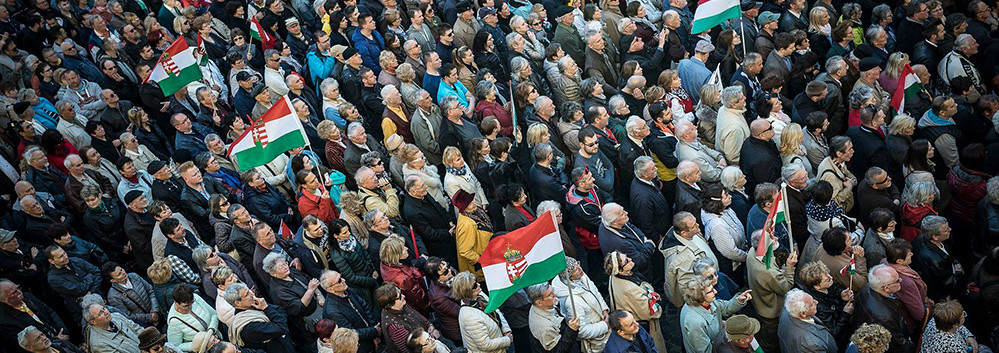The Hungarians Rebel Against the Brussels Elite and Against the Left Wing in the Polls
The Hungarian parliamentary elections on Sunday have led to a clear defeat of the Brussels elite in favor of supporters of an EU that respects national sovereignty.
The Orbán government coalition wins two thirds of the seats
According to the official scrutiny, the government coalition formed by the conservative Fidesz party of Viktor Orbán and its allies of the Christian Democratic Party (KDNP) has obtained an overwhelming majority, with 133 of the 199 seats in the National Assembly, just two thirds, the necessary to change the Constitution of the country in case of proposing it. Some progressive media have already begun to choke on the result, directing their manipulations against the winning bid. What bothers them, perhaps, is that this result is a clear endorsement by the Hungarians of Orbán's criticism of the massive immigration policies imposed by Brussels, policies that generate insecurity and are giving rise to large areas of Europeans cities are outside the law and under the control of Islamic fundamentalists. But also, economically, Hungary has gone from 11.2% of unemployment in 2010, when Orbán came to power, to 3.3% in 2018, and from a growth of 0.7% in 2010 to one of 4% of GDP in 2017. How many Europeans know this information through the media they usually follow?
A discourse of values abandoned by the complexed right
The success of Orbán is also due to another front that has abandoned most of the most complexed European right: values. Viktor Orbán has been defending the Christian identity of Hungary without detours or complexes, against the progressive impositions of Brussels. In fact, last night the Prime Minister celebrated his victory with a picture of his family and the message "Soli Deo gloria!" ("Glory to God alone"), a frequent expression among Protestant Christians (Orbán is Calvinist). In 2011, the Fidesz government approved a Constitutional reform that recognizes the Christian roots of the country, defends the natural marriage and protects human life from conception. It has also approved measures to support the birth rate, so that in Hungary it has gone from 1.23 children per woman in 2011 to 1.53 in 2016.
The left-wing was willing to agree with neo-fascists to oust Orbán
The second most voted force in yesterday's elections was the Jobbik, a neo-fascist and anti-Semitic party that has been skimming 20% of the vote. Its president, Gábor Vona, has tried to present a more moderate image of the party, hiding his anti-Semitic discourse and presenting himself as a transversal conservative formation, to try to capture the center-right vote unhappy with Fidesz. That strategy has allowed him to advance the Socialists and has reported almost three more points in the percentage of votes, from 23 to 26 deputies. The case of this party is very singular, since leftist candidates had been favorable to join forces with the Jobbik to throw to Orbán of the power. And those politicians have not been alone: media related to the opposition have also opted for this alliance. In November, the left-wing digital newspaper 24.hu attempted to create an electoral alliance between the Jobbik and the left parties by using polls that aimed at supporting opposition voters to that possibility. Recall that there was already a precedent in the case of Greece, when the far-leftist party Syriza allied with an far-right and anti-Semitic party, Independent Greeks (ANEL) of Panos Kammenos, an alliance that some leftist media whitewashed lowering the qualifications to the partners of Syriza .
The collapse of the heirs of the single party of communist Hungary
The most disadvantaged candidate in the elections yesterday was the Hungarian Socialist Party (MSZP), member of the European Socialist Party (to which the PSOE of Spain and the SPD of Germany belong), is heir of the Hungarian Socialist Workers Party (MSZMP), the organization that governed in Hungary during the communist dictatorship between 1956 and 1989. In 2014, attending alone, won 38 seats. Recall that in 2006 this party had achieved 43.2% of the votes and 190 seats, taking over the Hungarian government. Well: the MSZP went to the elections yesterday in coalition with the leftists of Párbeszéd (some European media have described them as "liberal", when in reality it is a rather social democratic party). At the moment the Párbeszéd had a single deputy in the National Assembly. Yesterday the coalition of both parties won 20 seats, remaining as the third force.
In total the left-wing with representation has only 25% of the votes
These have been the results of the minority candidacies:
- The Democratic Coalition (DK) has doubled its support. This formation, emerged from a split of the Hungarian Socialist Party in 2010, achieved 4 deputies in the National Assembly in 2014 going in coalition with the Socialist Party. In the elections yesterday it won 9 seats.
- The leftist ecologists of the Other Politics is Possible (LMP) party had 6 seats so far and now they win two more.
- The Együtt progressives won a single seat in 2014, joining the coalition with the Socialist Party. The party maintains its only seat.
- The party National Self-Government of the Germans in Hungary (MNOÖ), a conservative nationalist formation that represents the German minority in the country, has won its first seat since the founding of that party in 1995.
- Finally, Dr. Tamás Mellár, a former member of Fidesz, has achieved an independent seat in the district of Baranya.
These new elections confirm the strength of the government coalition headed by Orbán and leave the left on the floor. To give us an idea, the four leftist parties that have obtained representation account for a total of 25% of the vote. Of course, it has to be said, the Hungarian left enjoys better health than Poland, a country in which it does not even have a single seat in the Sejm, the lower chamber of the Polish Parliament.
---
(Photo: Facebook of Viktor Orbán)
|
Don't miss the news and content that interest you. Receive the free daily newsletter in your email: Click here to subscribe |
- Most read
- A spectacular video of an Alpha Scramble with Eurofighter aircraft from Spain and Germany
- The ten oldest national flags in the world that are still in use today
- Argentina buys 24 F-16s and we can now see how they will be armed and decorated
- Lenin: numbers, data and images of the crimes of the first communist dictator
- A repentant doctor: “I feel very guilty about all the abortions I performed”
- The newspaper El Mundo calls a member of an active terrorist group a 'Palestinian militant'
- United States' last Hueys: Vietnam-era veterans still flying in the US Air Force

 ES
ES





Opina sobre esta entrada: